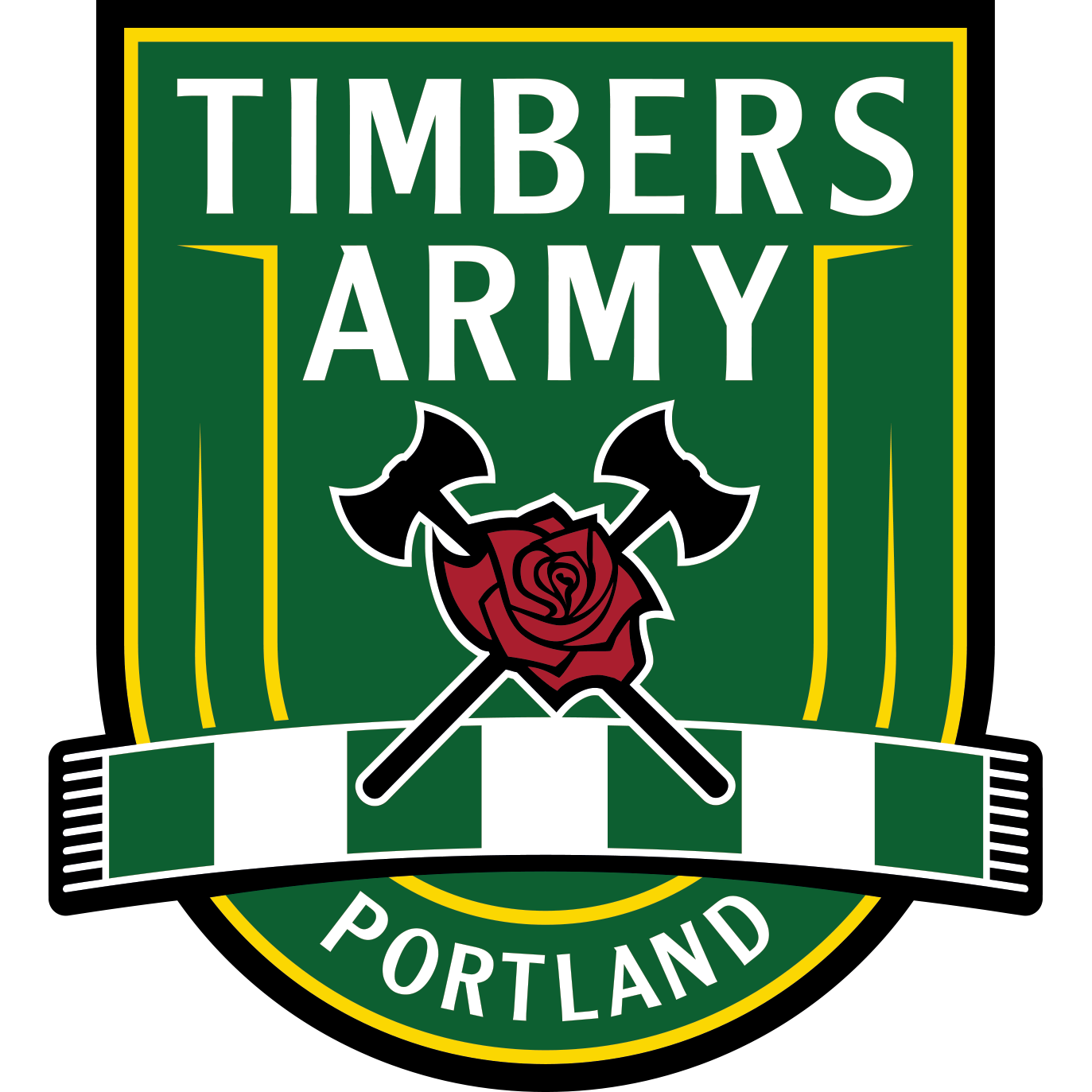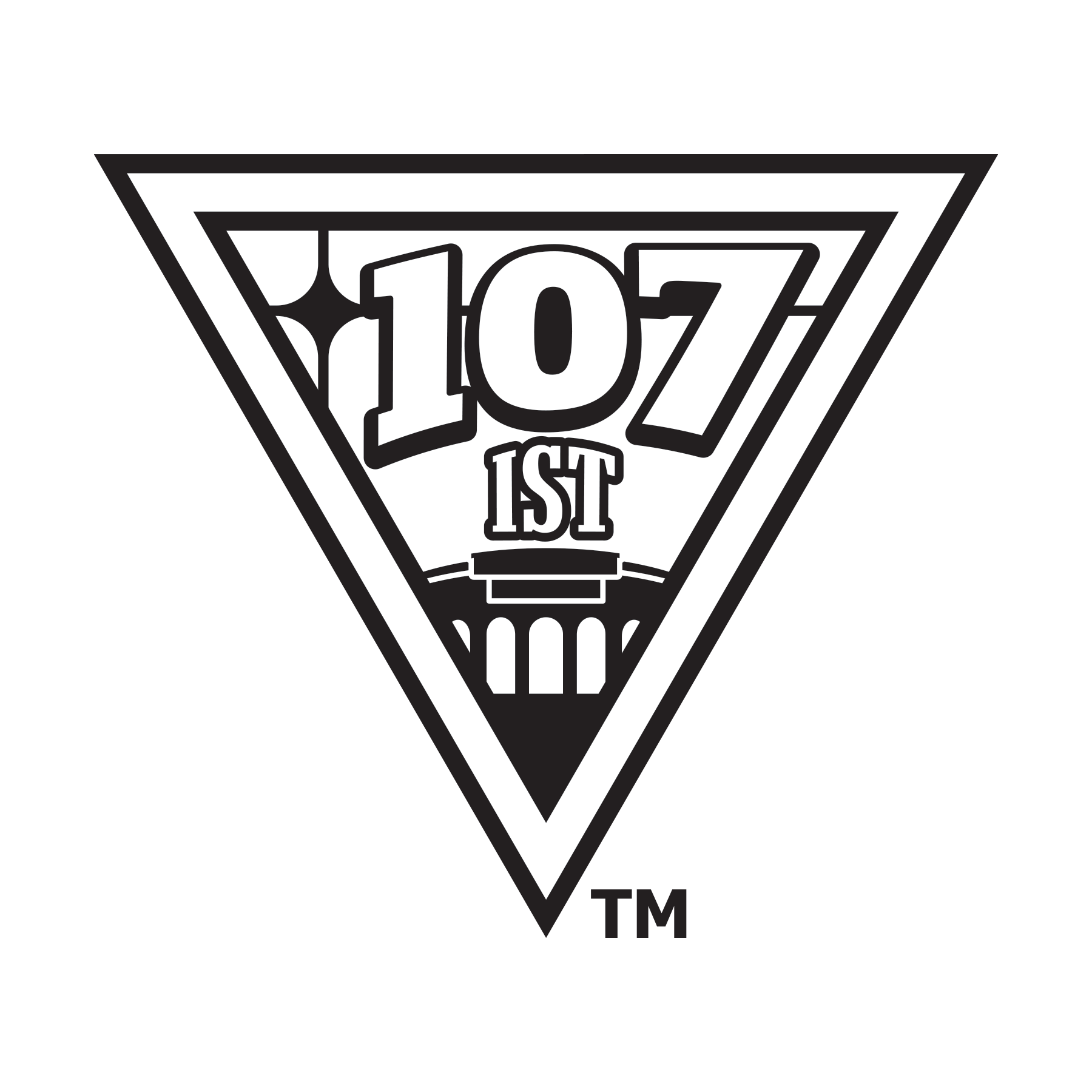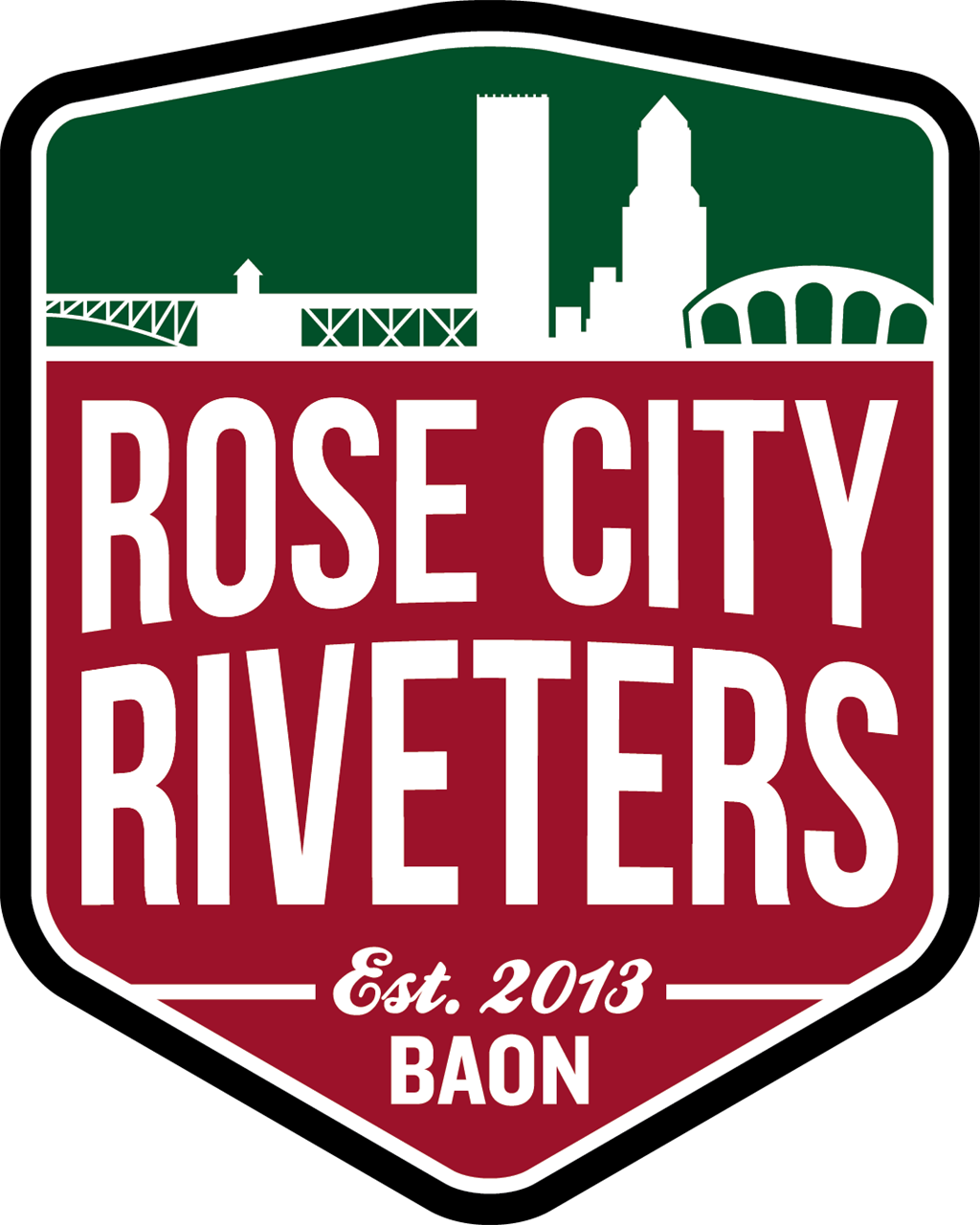-by Abram Goldman-Armstrong
A football club in a river port known for strippers and beer with fans with a rabid punk rock reputation? Sound familiar?
My first exposure to St. Pauli was actually in the mid-1990s punk scene in Minneapolis and St. Paul, when I saw punks sporting the skull and crossbones logo of the supporters that had been adopted by the club. Upon enquiring about it I heard tales of these crazy anti-fascist punk rock football supporters in Germany. I was intrigued, being that my leather jacket bore the crest of the Portland Pride, our indoor club at the time, and I was heavily involved in the punk scene, publishing my own fanzine and attending demos and shows; this confluence of punk rock and football seemed like a good deal. Over the years I learned more about St. Pauli and their activist punk rock fans and was fascinated, hoping one day to meet these legendary supporters.
I heard more about St. Pauli while living in Cork City in 1997-1998. One image, from an English football magazine of a St. Pauli supporter in hard hat and safety glasses due to the amount of things thrown, sticks with me.
Back home in Portland in 2001 as we organized as supporters in section 107, the punks and anti-racist skinheads quickly established the Zero Tolerance for Intolerance stance that exists to this day. Politically aligning what was to become the Timbers Army with the St. Pauli supporters. It was only natural in Portland to have a stance against racism and homophobia, so as the Timbers Army began to take shape we looked to like-minded supporters around the world as examples. Chicago’s Section 8 was an inspiration initially, and we drew on various traditions; as we grew and the MLS loomed large, St. Pauli’s example was of huge significance as we strove to find a way to keep our vibrant traditions and supporters culture alive in a more corporate league with fewer rights for fans.
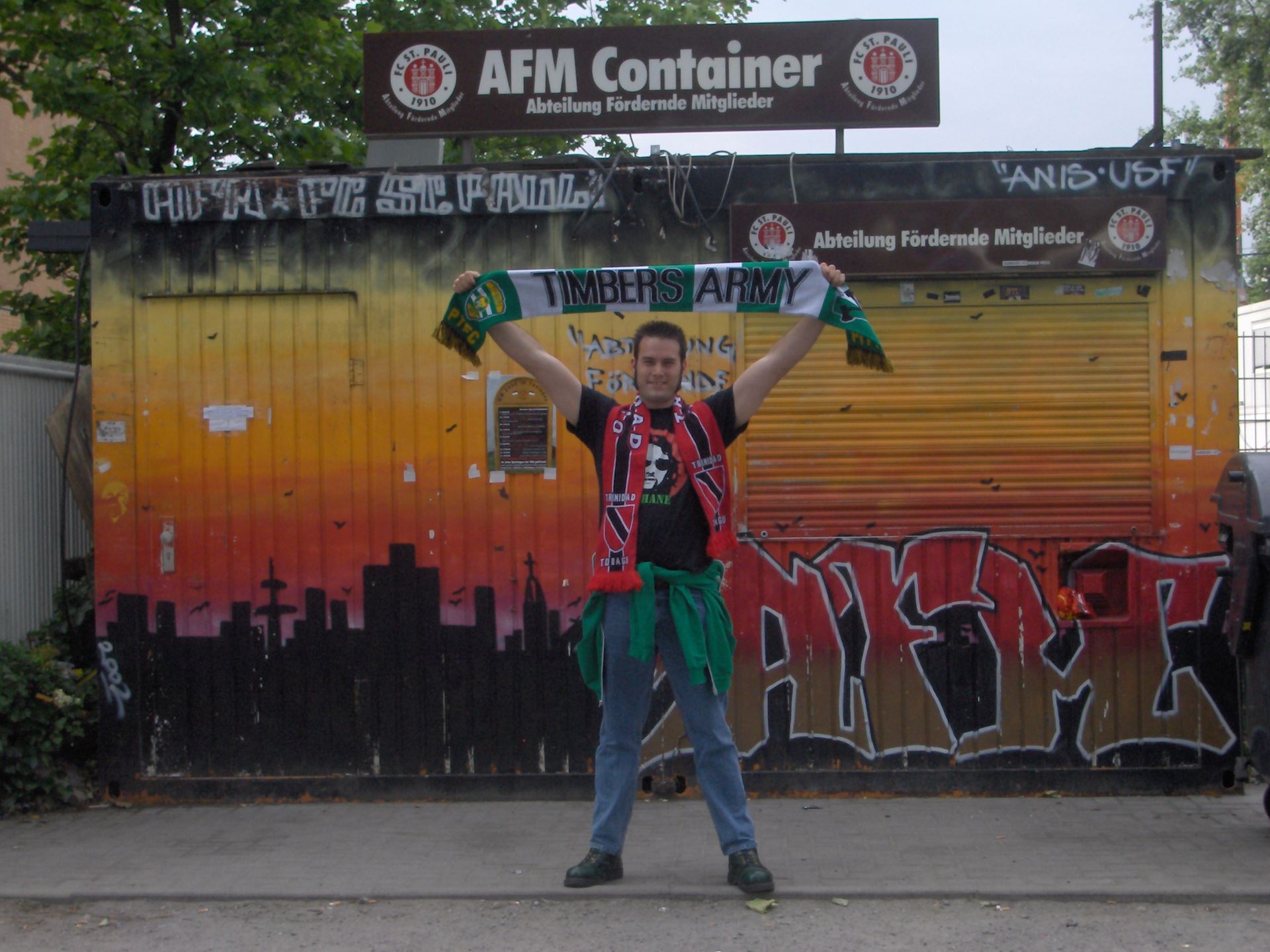
Scarf up by the supporters container at the Millerntor
F.C. St. Pauli was founded in 1910 in a working-class quarter of the city of Hamburg. Like many European sporting clubs, it boasts not only a football club, but men’s and women’s rugby clubs. For many years it was merely a sports club; then something magical happened. A movement coalesced around the club to make it into a fan-driven culture.
St. Pauli’s political and organized support began in the 1980s as part of the squat defense movement. The cops were attempting to shut down a series of squatted apartment buildings by the harbor, and the local punks were determined to defend them. Barricades were erected and street battles took place. Many of the same people who were defending the squats would see each other at St. Pauli matches, and soon began incorporating political banners into their support. Eventually the supporters organized and created a unique left-wing supporters culture, an anomaly in German football where Neo-Nazis were all too common amongst supporters. Banners against racism, as well as in solidarity with Palestinians, were common and could be seen at matches. When a plan was made to knock down the stadium with its classic terraces and replace it with a “Sport Dome” in the early 1990s, the fans demonstrated against it and stopped the project.
Now St. Pauli is know worldwide for its supporters’ radical stance, celebrating gay and trans rights, multiculturalism, and the rights of immigrants and refugees. St. Pauli hosts the Antira tournament for anti-racist amateur teams from across Europe every other summer. The work the supporters do is far-reaching in many aspects of life. Their punk rock sentiments extend from their stance on social issues to their taste in music, with Cascadia’s own Scottish punks the Real McKenzies picked to headline the club’s 100th birthday party in 2010. But I’m getting ahead of myself – I still haven’t related the story of how I came to meet the fans of St. Pauli.
In 2004 I visited the Sinn Féin Shop in Cork City and picked up the CD Granda Was a Celtic Man by a band called the Pilgrims. On it appears the true story “The Fans of St. Pauli", a fairytale story of how a lonely Celtic fan was embraced by the St. Pauli supporters.
“The jukebox played the Dubliners and the crowd all sang along,
Each boy and girl in that Hamburg bar knew the words to every song,
They most graciously invited me to join their company.
So I spent that night and the next three years with the fans of St. Pauli.
By the time the night was over, the arrangements were complete,
I’d a squat and friends, a darlin’ girl, and a brand new football team."
–The Pilgrims, “Fans of St. Pauli”
In 2006, when I went to Germany for the World Cup, I was eager to find out if the song was true, and within the first few hours of being in the St. Pauli quarter I’d hung a Timbers Army scarf in an Irish pub, which did indeed play the Dubliners.
The best was yet to come, though. After watching England beat Trinidad and Tobago, including Peter Crouch’s flagrant foul on former Timber Brent Sancho (which was not called by the referee), pulling his dreadlocks to win a header over him, Katie Moody and I headed to the St. Pauli Clubheim to watch the next match.
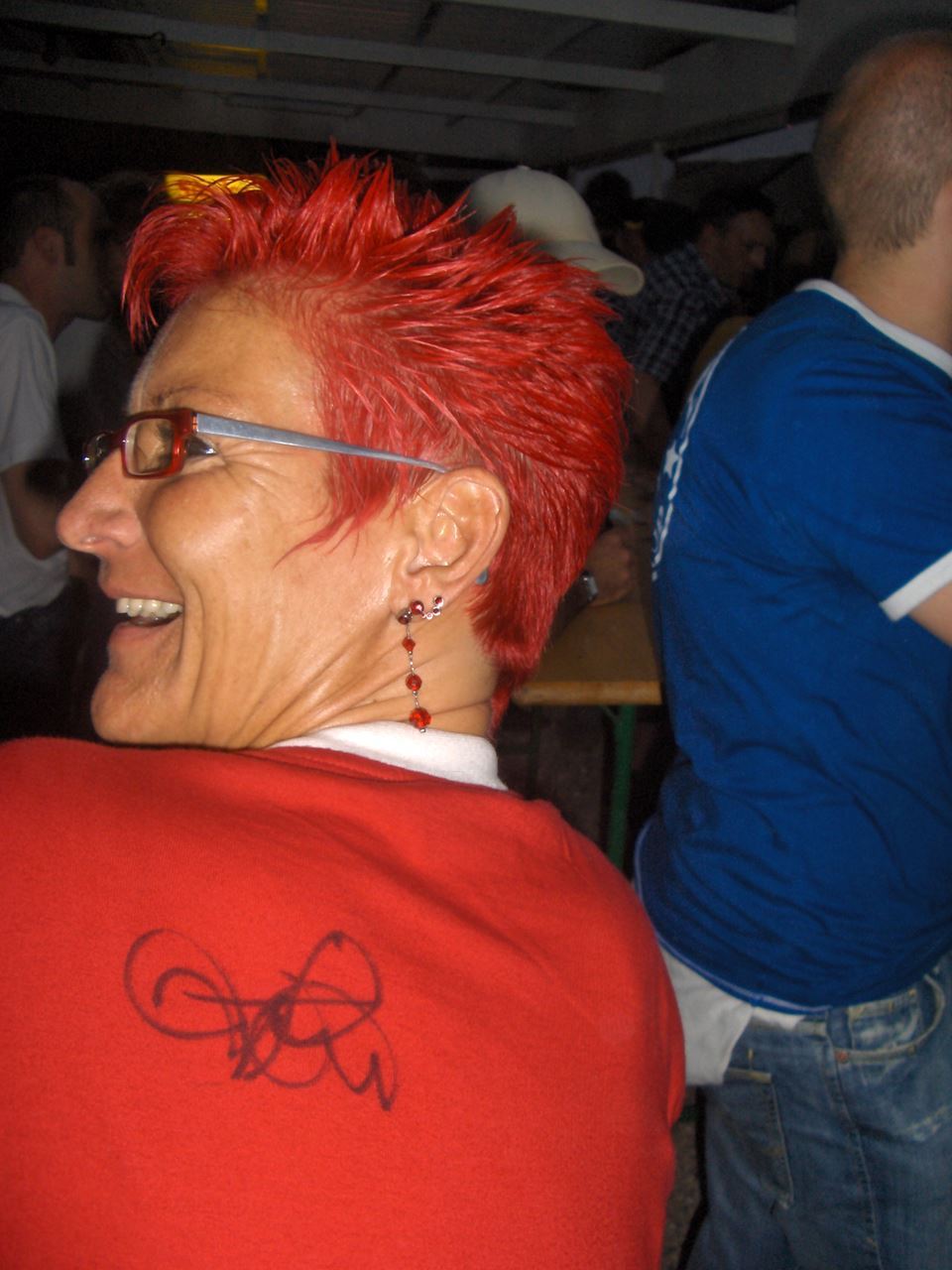 Imme shows off her Sancho autograph
Imme shows off her Sancho autograph
We soon struck up a conversation with Imme, who worked with the St. Pauli community outreach team, who happened to be sporting a Trinidadian top autographed by Brent Sancho. By the time the match ended, we were trading rounds and swapping stories and were invited home by the St. Pauli fans. Tonja, who owns a punk boutique, was visiting Seattle in 2004 and she and her boyfriend went to a Timbers-Sounders match; after hearing our singing, they came over to stand with us in the away support section in Seahawks Stadium, as the Timbers Army singing reminded her of home. Through the blur of Seattle Away memories, I did remember a pink-haired German punk girl at that match. The song was true all right, and how!
We soon cancelled our hostel reservation and headed back to Imme and her partner Mitje’s flat to sing along with videos of Gary Og singing Irish Rebel songs at the Jolly Roger, St. Pauli’s bar, and talk till the sun came up. We were headed south the next day, but I was invited back, and ended up spending a week in St. Pauli.
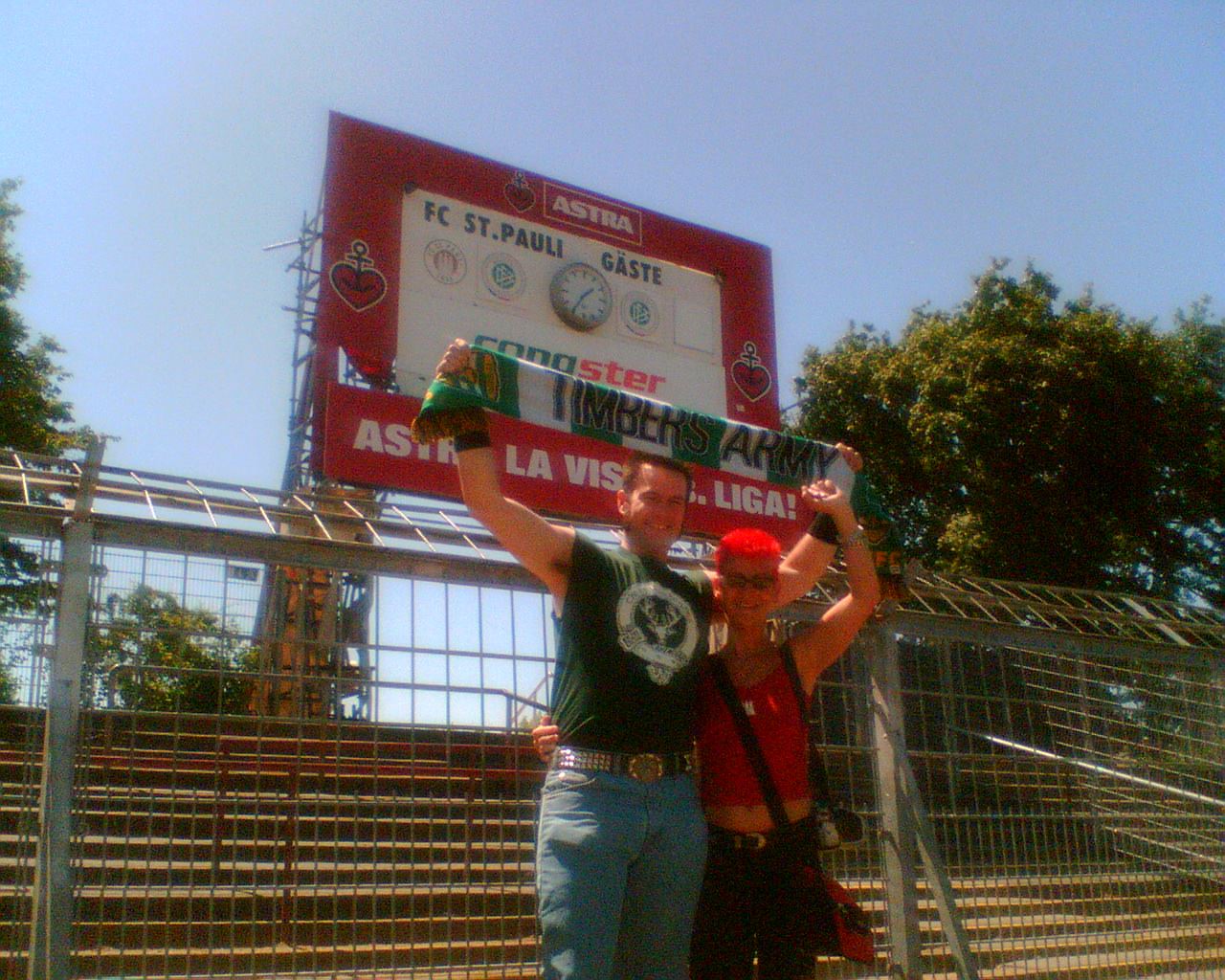 Imme and me in the Millerntor
Imme and me in the Millerntor
I visited the Fanladen, which was part coffee shop, part bar, part zine library, part meeting space; this supporter-run shop had been around since 1990. There were football zines from all over, and Heiko showed me the Celtic-branded whisky the Scots had brought over for their annual Celtic-St. Pauli party, when hundreds of Scots descend on the city. The Fanladen was the center of independent supporter activity, organizing away travel as well as serving as a home to fanzines, including the Ueberstieger, a glossy full-color magazine.
One famous away trip Imme told me about was a trip to Dresden, where Neo-Nazi hooligans planned to attack the St. Pauli supporters. The generally punky-looking St. Pauli supporters dressed up in business suits and bought copies of the Financial Times so that when the train arrived in Dresden, the hooligans waiting for it were confused – where were the freaky looking punks with dyed hair? Just a bunch of businessmen and women got off the train.
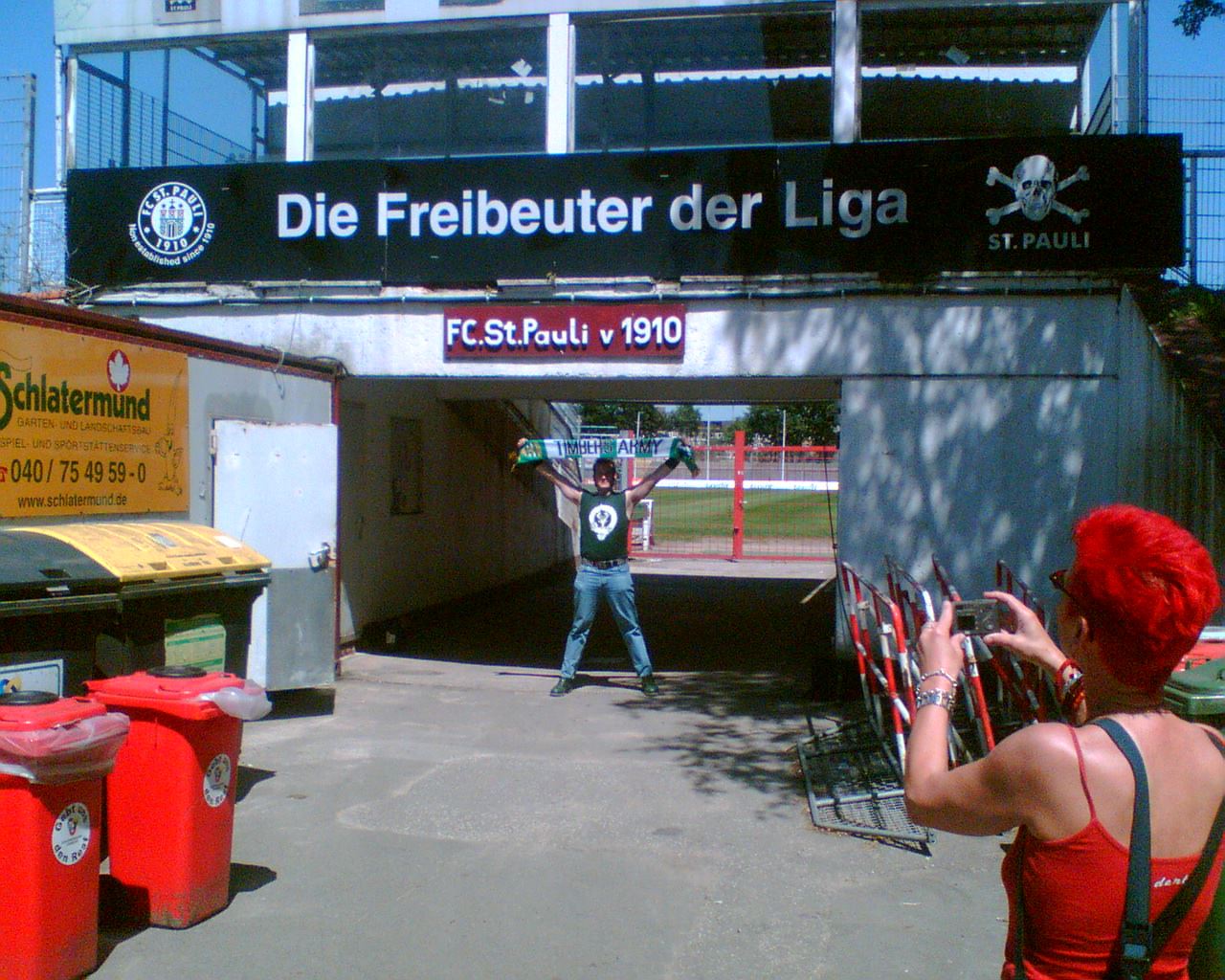 Obligatory Scarf Up pic in the Millerntor stadium
Obligatory Scarf Up pic in the Millerntor stadium
The scope of the Fanladen was very impressive, and sowed the seed in my head for how our own Fanladen would eventually be when I helped bring it to fruition five years later.
The whole visit was inspirational on many levels – the generosity and hospitality of the supporters was exceptional, but beyond that, it was just seeing the amount of organization that the fans had achieved and how they had gained so much power with the club.
I met Sven Brux, who was one of the original organizers of the supporters and now held the post of head of security for the club. He told me, “It breaks my heart every time I have to issue someone a ban for pyro.” He also gave his own account of how the political activism at the club in the 1980s grew out of punk rockers involved with defending squats from the police. As he related it, the punks would see each other on the barricades at the squat defense, and the same people would see each other at matches, and soon started bringing their politics to the matches.
The new political fans soon made going to St. Pauli the cool thing to do. At the time (2006) there was a lottery for season tickets, with fans assembling outside the stadium for the draw each year. With the stadium completely sold out, it is difficult to get a season ticket.
Watching the Germany-Argentina match with Imme, Mitje, Sven and a bunch of St. Pauli supporters in an “Ecke” (small pub, literally translating as Corner (as in corner bar), was a very interesting experience: the supporters want Germany to do well, but being against nationalism, they expressed concern about the flag-waving mobs out on the Reeperbahn. As Sven explains, the last time there was flag-waving sentiment associated with the German team doing well, there were assaults on LGBT and immigrants.
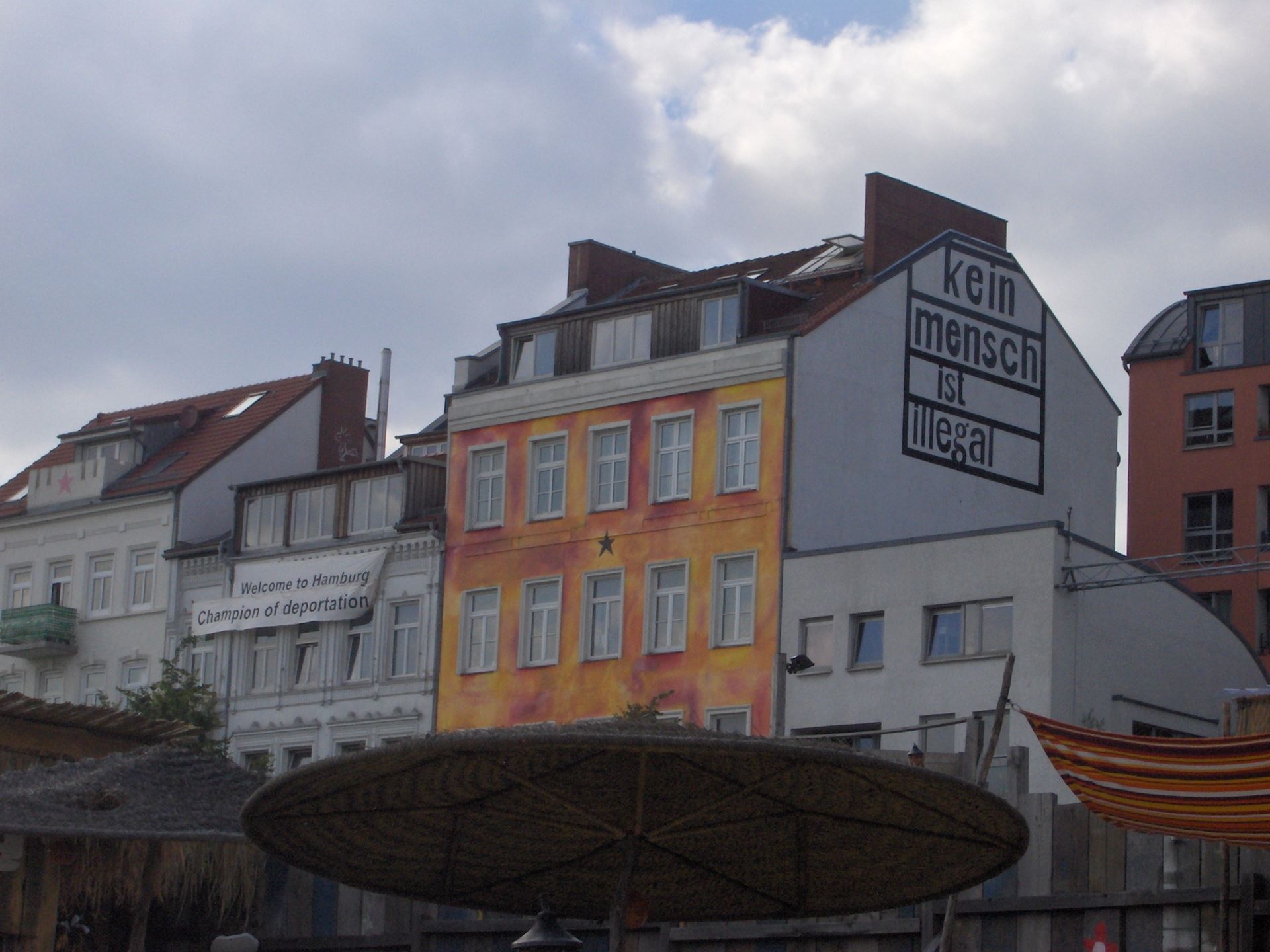 Kein Mensch ist Illegal
Kein Mensch ist Illegal
The St. Pauli quarter is one that looks out for its own, and the supporters work to defend the rights of immigrants. A sign on one of the squats by the harbor decries Hamburg’s status as “World Champion of Deportations.” There are large detention facilities there where immigrants are held as they await being sent back to their countries of origin. “Kein Mensch ist Illegal” (No Person is Illegal), reads a mural on the squat next door.
While I was in St. Pauli, Imme and Mitje took me to the Kunst art gallery, where there was an exhibit of Repression in the Stadium sponsored by the Hamburg-based BAFF (Bündnis aktiver Fussballfans, or League of Active Football Fans). The BAFF is dedicated to fighting for the rights of supporters in all levels of football in Germany, including the right to terracing, fighting against data collection on fans and stadium bans, and also fights to make football stadiums inclusive places for LGBT and people of all backgrounds and abilities, backing initiatives such as Show Racism the Red Card and anti-homophobia displays. The exhibit really struck a chord with me. The amount of surveillance and harassment that European supporters are subjected to is astounding, but the fact that the BAFF united supporters from all clubs to work for common goals was really inspiring. When I came back home, I talked with folks involved in the nascent 107ist about organizing something similar and began reaching out to supporters of other clubs, especially with the MLS looming, and when Seattle hosted the MLS Cup in 2009 we got supporter representatives from Union Ultras (Chivas USA), Sons of Ben (Philly), Vancouver Southsiders, San Jose, Sounders, and Victoria Highlanders to join us at Elysian Fields to found what was to become the Independent Supporters Council.
When I began publishing the Whipsaw Timbers Army fanzine in 2010, I naturally began swapping with some of the St. Pauli fanzines, including the Uebersteiger and In the Streets of St. Pauli, the zine of Skinheads St. Pauli, an organization of anti-racist skinheads established in 1996. When Ian Joy joined the team, I interviewed him about his time in St. Pauli for the Whipsaw and In the Streets of St. Pauli translated it into German and published it. They also said some very kind things about various issues of the Whipsaw.
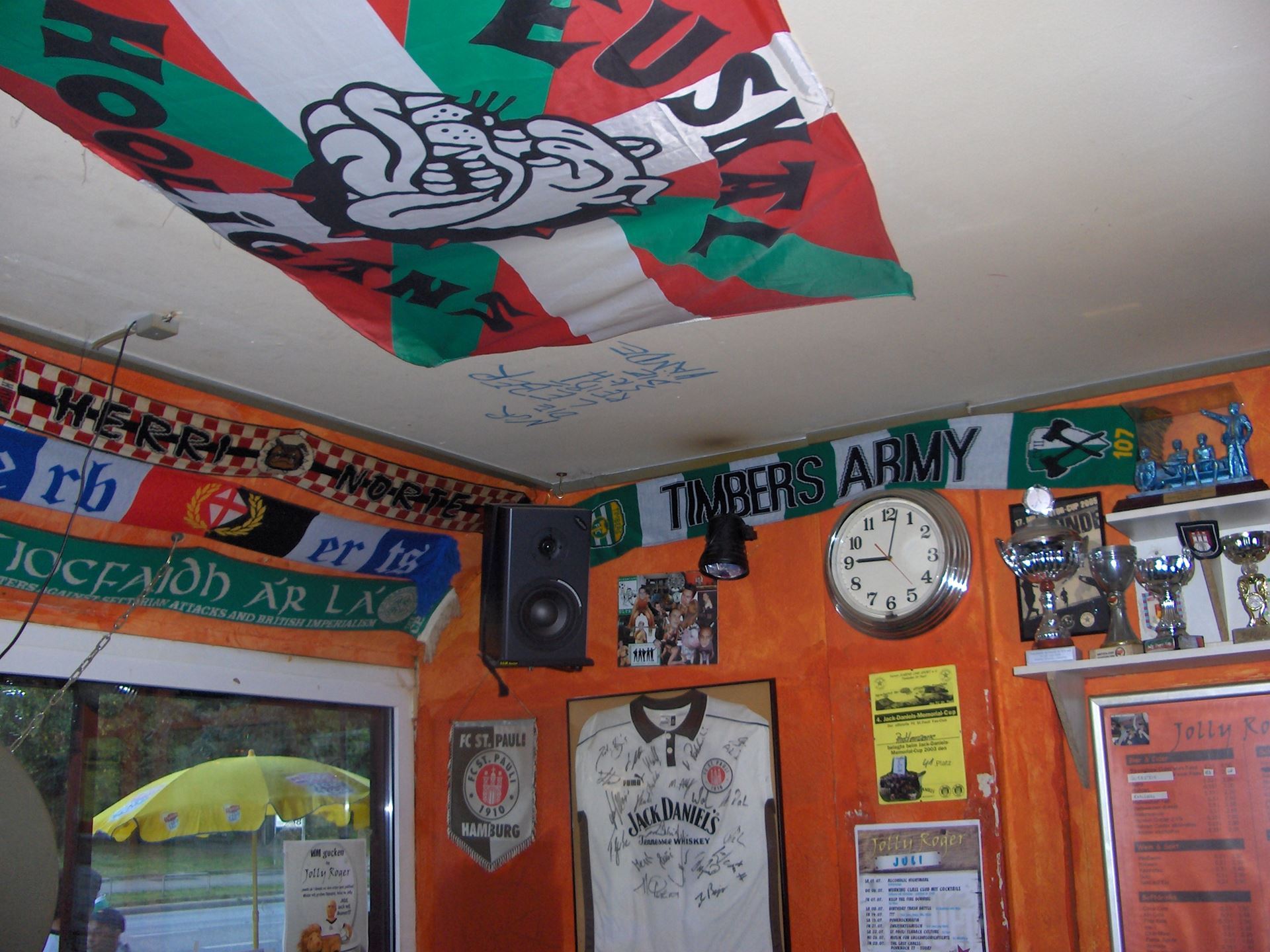 I got to hang a TA scarf in the Jolly Roger, along with other antifa clubs' scarves
I got to hang a TA scarf in the Jolly Roger, along with other antifa clubs' scarves
Sadly, since I started Cider Riot! in 2013, I haven’t had time to dedicate to the zine, and couldn’t find anyone to keep it going. Thus I’m a bit out of date on the happenings in the St. Pauli zine world. St. Pauli connections are truly global though, and in 2014 while visiting cideries in England, I met Kev from the scrumpy and western band the Skimmity Hitchers in Bristol, and he invited me out to practice with his club, the Easton Cowboys. The Easton Cowboys are Bristol’s anarchist football club, with 3 men’s teams and two women’s teams as well as teams in cricket and netball. The Cowboys travel to St. Pauli’s Antira football tournament and host their own anti-racist football tournament each summer, and have done solidarity trips to Chiapas and Palestine. When I showed up to practice in my St. Pauli top I was in good company, as half the Cowboys seemed to be sporting at least one article of St. Pauli merch! Kev put me in touch with one of his contacts from the Antira tournament in advance of the friendly.
As I was writing this article I stopped by the Widmer Brothers Pub to drop off entries for a cider competition, and while having a pint there, began chatting with a German visiting Portland on holiday who lived in St. Pauli when he was young. He spoke of the resiliency of the St. Pauli quarter; he said that despite its problems with homelessness and poverty, the quarter sticks together. This sense of solidarity prevails amongst the supporters.
So as we get ready to host the fans of St. Pauli, I look forward to returning their immense hospitality. We’re hosting an afterparty at Cider Riot! to benefit the Immigrant Rights Coalition. There will be punk rock, beer, cider, and hopefully some great conversation. Yeah, I know it’s a school night, but we are going to show them the best time possible! Please join us after the match for music from Green Flag and pints from Cider Riot! and Rosenstadt Brewery.
Glossary:
St Pauli Quarter: The district where the club plays, also home to the red light district centered around the Reeperbahn (so-called as it was a rope-making center for the tall ships which once sailed from Hamburg’s active port).
Astra: The beer of choice of St. Pauli fans.
Fanladen: The inspiration for our own Fanladen – one part meeting hall, one part reading room, one part bar.
The Jolly Roger: St. Pauli supporters pub.
Moin: Hamburg slang for Hello, often “Moin Moin”.
Millerntor: The stadium, literally the Miller’s Tower.
Reeperbahn: Hamburg’s famous red-light district.
HH (Hansa Hamburg): Hamburg was historically part of the Hanseatic League of city states. Much like our Cascadia flags, the use of the moniker Hansa Hamburg celebrates this independence from the rest of Germany.
Kit sponsors: St. Pauli has boasted a slew of rather unique kit sponsors, from Jack Daniels to the Swedish punk band Turbonegro.
